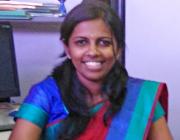|
PROGRAMME: COMPUTER SCIENCE & ENGINEERING |
DEGREE: BTECH |
|
COURSE: COMPUTER GRAPHICS |
SEMESTER: VII CREDITS: 4 |
|
COURSE CODE: CS401 |
COURSE TYPE:CORE |
|
COURSE AREA/DOMAIN: RECENT TRENDS IN COMPUTING |
CONTACT HOURS: 4-0-0(L-T-P) hours/Week. |
|
CORRESPONDING LAB COURSE CODE (IF ANY): NIL |
LAB COURSE NAME: NIL |
SYLLABUS:
|
UNIT |
DETAILS |
HOURS |
|
I |
Basic concepts in Computer Graphics – Types of Graphic Devices – Interactive Graphic inputs – Raster Scan and Random Scan Displays. |
7 |
|
II |
Line Drawing Algorithm- DDA, Bresenham’s algorithm – Circle Generation Algorithms –Mid point circle algorithm, Bresenham’s algorithm- Scan Conversion-frame buffers – solid area scan conversion – polygon filling algorithms |
8 |
|
III |
Two dimensional transformations. Homogeneous coordinate systems – matrix formulation and concatenation of transformations. Windowing concepts –Window to Viewport Transformation- Two dimensional clipping-Line clipping – Cohen Sutherland, Midpoint Subdivision algorithm |
8 |
|
IV |
Polygon clipping-Sutherland Hodgeman algorithm, Weiler- Atherton algorithm, Three dimensional object representation- Polygon surfaces, Quadric surfaces – Basic 3D transformations |
8 |
|
V |
Projections – Parallel and perspective projections – vanishing points. Visible surface detection methods– Back face removal- Z-Buffer algorithm, A-buffer algorithm, Depth-sorting method, Scan line algorithm. |
9 |
|
VI |
Image processing – Introduction - Fundamental steps in image processing – digital image representations – relationship between pixels – gray level histogram –spatial convolution and correlation – edge detection – Robert, Prewitt, Sobel. |
8 |
|
TOTAL HOURS |
48 |
|
TEXT/REFERENCE BOOKS:
|
T/R |
BOOK TITLE/AUTHORS/PUBLICATION |
|
|
Text Books: 1. Donald Hearn and M. Pauline Baker, Computer Graphics, PHI, 2e, 1996 2. E. Gose, R. Johnsonbaugh and S. Jost., Pattern Recognition and Image Analysis, PHI PTR, 1996 (Module VI – Image Processing part) 3. William M. Newman and Robert F. Sproull , Principles of Interactive Computer Graphics. McGraw Hill, 2e, 1979 4. Zhigang Xiang and Roy Plastock, Computer Graphics (Schaum’s outline Series), McGraw Hill, 1986. |
|
|
References: 1. David F. Rogers , Procedural Elements for Computer Graphics, Tata McGraw Hill, 2001. 2. M. Sonka, V. Hlavac, and R. Boyle, Image Processing, Analysis, and Machine Vision, Thomson India Edition, 2007. 3. Rafael C. Gonzalez and Richard E. Woods, Digital Image Processing. Pearson, 2017 |
|
|
|
COURSE PRE-REQUISITES:
|
C.CODE |
COURSE NAME |
DESCRIPTION |
SEM |
|
MA 101 |
Engineering Mathematic I |
Basic familiarity with calculus and linear algebra |
S1 |
|
CS 105 |
Introduction to Computing and Problem Solving |
Programming skills |
S3 |
COURSE OBJECTIVES:
|
|
|
COURSE OUTCOMES:
|
CS401.1 |
The Students will be able to compare various graphics devices |
|
CS401.2 |
The Students will be able to analyze and implement algorithms for line drawing, circle drawing and polygon filling |
|
CS401.3 |
The Students will be able to apply geometrical transformation on 2D and 3D objects |
|
CS401.4 |
The Students will be able to analyze and implement algorithms for clipping |
|
CS401.5 |
The Students will be able to apply various projection techniques on 3D objects |
|
CS401.6 |
The Students will be able to summarize visible surface detection methods |
|
CS401.7 |
The Students will be able to interpret various concepts and basic operations of image processing |
